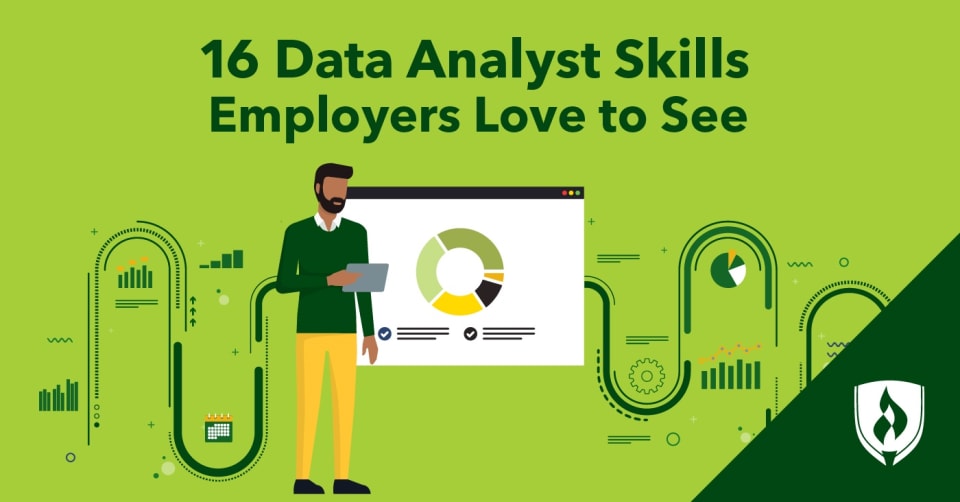
Data is practically everywhere in our digital age. People generate information about themselves nearly every time they use a device—in ways as varied as wearing a fitness tracker to shopping for groceries online.
While the scale of it all can be almost mind-binding to consider, there are good reasons for why these mountains of information are being gathered every day. This data can yield valuable information for businesses and organizations—if they know what to do with it. That’s where data analysts come in. These tech pros dig into raw data to uncover patterns, trends and other relevant information that may not be easily perceptible.
It’s a skill set that’s made data analysts needed in a huge variety of industries. Organizations need someone to effectively and accurately interpret data in order to understand everything from their audience to the number of sales generated by a tactic.
Maybe that someone could be you—you already incorporate technology into every facet of your life, and there’s nothing you love more than digging into a problem to find the solution everyone else missed. You have a hunch that data analysis could be the perfect fit for your natural talents.
We did some digging of our own to reveal the data analyst skills that are needed to succeed in this growing career. Keep reading to discover if your interest in technology could lead you down a new career path to data analysis.
What are data analysts?
Data analysts are responsible for collecting and organizing data and then using that information to help solve problems or answer questions. These tech pros find meaningful patterns and trends hidden throughout raw data. Data analysts bring together analysis, technology and business objectives to ensure that all the data they collect is used to achieve desired results for their company.
For example, data analysts could uncover patient trends and improve care at a healthcare facility or break down customer spending habits for a retail chain that wants to increase profits.
No matter which field they work in, data analysts need a mix of both technical and soft skills to do their job well. Take a look at these data analyst skills to get an idea of what you’ll need to succeed in this tech career.
Technical skills for data analysts
As you might imagine, it takes some serious technical ability to be a successful data analyst. There is a multitude of coding languages, specialized software programs and other technical knowledge that a data analyst could potentially bring to the table, and it can be hard to know which skills are most valued by employers.
To help answer that, we analyzed more than 66,000 data analyst job postings to reveal the top technical skills employers are looking for.1 If you’ve got your eye on pursuing a data analyst career and aren’t sure which tech skills to focus on, this list can provide a solid starting point.
Technical skills employers want from data analysts:
- SQL
- Tableau®
- Data warehousing
- Python®
- SAS®
- Microsoft Power BI®
- Project management
- Extraction Transformation and Loading (ETL)
- Oracle® Database
- Data mining
- Data modeling
As you can see, data analysts are expected to be comfortable with a wide range of programming languages and tech tools. It can be daunting to see all these technical skills listed out, but there’s no need to worry. A focused data analytics program, like the Rasmussen University Data Analytics Bachelor’s degree, can help get you up to speed. In fact, the program is designed to align with many of the skills and programs listed above. For example, the Data Analytics coursework meets the standards of a SAS® Joint Certificate program, which demonstrates students’ proficiency with an industry-leading data analysis tool.
But this is just part of the equation—it takes more than technical know-how to stand out as a data analyst. We also rounded up the soft skills that could come in handy in this career. You might discover that you already have many of the skills you’ll use as a data analyst.
The soft skills that make data analysts shine
There’s more to data analysis than knowing your way around technology. Transferable soft skills play a large role as data analysts work with others in their organization to harness the power of data.
We turned to our analysis of real-time data analyst job postings to find out which soft skills are most important in this field.1 Read on to find out if you already have some of the necessary qualities for this career.
Communication
A data analyst’s work digging through raw data doesn’t help anyone if they lack the communication skills to tell the rest of their team about their findings in a way that’s easy to understand. Data analysts should have excellent communications skills across a variety of mediums, including written, verbal and specialty visualization software.
Data analysts may be required to report their conclusions to a team in a group setting, so public speaking and presentation are valuable skills as well. Thanks to top-notch communication skills, data analysts can help their company’s leaders make informed decisions about what to do next.
Problem-solving
Mining for and organizing data doesn’t happen with just the push of a button. Technology doesn’t always run perfectly. When hiccups arise in an algorithm, a database or lines of code, data analysts must be able to find and troubleshoot the problem so they can continue to efficiently capture the data they need.
Data analysts also put their problem-solving skills to work when collaborating with their team on big-picture issues. They must work together with others in their company to decide which problems to target and how to solve them via data analysis.
Research
You might think data analysts have all the information they need at their fingertips. The truth is that data analysts should be prepared to do some digging if they want to make the most out of the data they collect. If you’re trying to tell a story or interpret raw data, you’ll need to be comfortable researching and asking questions to put that information into proper context.
Data analysts use research to stay on top of industry trends so they can interpret the most meaningful insights from their data. Research also comes in handy when they’re presenting their findings to their colleagues and defending their position on what move the organization should make next.
Attention to detail
In many ways, a data analyst’s job is similar to searching for a needle in a haystack. Data analysts must be able to notice the small clues that point toward a larger message that’s hiding in a group of data. “The actual task of reporting and gathering data can be tedious and hard to read, so drawing meaningful conclusions from that data is a skill that can always be improved,” says Lauren Petermeyer, manager of digital strategy and planning at 301 Digital Media.
Attention to detail also comes in handy when data analysts build the processes that efficiently capture and sort data. A small error in a single line of code can throw the entire workflow awry. Data analysts should always be on the lookout for tiny mistakes that can lead to larger problems in the system.
Teamwork
Data analysts collaborate with people in a variety of positions to get the job done. They work with data scientists to determine what types of questions can be answered through data analysis. They also collaborate with web developers to ensure that their company’s website is designed to efficiently capture the data they need.
On a big-picture scale, data analysts collaborate with company leaders to determine how the latest data insights can guide the company in moving forward toward its objectives. Check out the difference between data analytics vs. data science.
Ready to pursue an education in data analytics? Read more about Rasmussen's data analytics program.
Related Articles:
1Burning-Glass.com (analysis of 66,234 data analyst job postings, July 1, 2020 – June 30, 2021).
Python is a registered trademark of The Python Software Foundation.
Tableau is a registered trademark of Tableau Software.
Oracle is a registered trademark of Oracle Corporation.
SAS is a registered trademark of SAS Institute, Inc.
Microsoft Power BI is a registered trademark of Microsoft, Inc.




